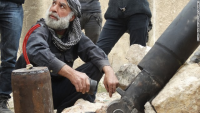
Sudan
On Sunday November 17, the Sudanese Air Forcebombed the town of Buram, south of the capital of South Kordofan. The reported Sudanese AF plane dropped two large bombs, which resulted in the deaths of two local children ages ten and seven and injuring many other civilians, damaging homes, and farms. Bombings against civilians have been continuous throughout South Kordofan for the better part of 2013 as the Regime in Khartoum continues their attempts to suppress opposition groups within the region and vie for greater influence from a civilian population that identifies with the South. Yasir Arman, Secretary General of the SPLM-N gave the following statement regarding this most recent bombing:
“To all those who continue to appease the Khartoum regime and ignore the solid facts on the ground, the Khartoum regime is targeting civilian populations in Sudan, committing war crimes, and killing the very children who need to be vaccinated. For the families of these children, the air and ground attacks by the Khartoum regime are more visible threats than polio. Many in Africa and in the international community circles are deliberately ignoring this fact. Admitting it would require them to provide civilian protection as per international humanitarian law.”
DRC
Two weeks ago, the M23 rebel group announced that, after a nearly two-year rebellion and weeks of unsuccessful talks with the Congolese government, it was prepared to demobilize its forces and turn its full attention towards political negotiations with Kinshasa.
The DRC was expected to sign a peace deal last week with representatives of the rebel group, which would detail the process of demobilization, including addressing the situation of reintegration of rebel troops into the Congolese army. At the last minute, however, the Congolese government refused to sign it, following an argument between the two sides over whether the document would be called a “peace agreement” or merely a “declaration.” The United Nations, the African Union, and the United States all expressed regret that the deal had not been signed.
M23’s decision to lay down its arms has inspired other rebel groups to do the same. Following M23’s declaration of disarmament, several other Congolese militia groups have expressed potential willingness to demobilize their forces.
Syria
The Organization for the Prohibition of Chemical Weapons (OPCW) approved a plan last Friday to destroy Syria’s chemical weapons by the end June 30, 2014. All chemical substances and precursors except isopropanol are supposed to be removed from Syria by February 5. Isopropanol is also widely used as a solvent in addition to making the chemical weapon sarin. Thus far, the OPCW has inspected 21 out of 23 sites and 39 out of 41 facilities at those sites. The remaining two sites were deemed too dangerous to enter, and the chemical weapons equipment there was supposedly moved to other sites which were inspected. The OPCW stated that 60% of Syria’s declared unfilled munitions have been destroyed and plans to destroy all unfilled warheads and bombs by January 31. Finding a country to destroy the chemicals themselves has proved illusive. Albania and Norway have both declined to destroy the chemicals. The United States is now considering a plan to destroy the precursor chemicalsat sea.
Infighting and human rights abuses have been increasing in factions of Syria’s armed opposition groups. In the north of Syria, attempts by the Islamic jihadist group Islamic State in Iraq and the Sham (ISIS) to establish hegemony have been met by hostility by Free Syrian Army (FSA) units and other groups, including the Islamist jihadist group Jabhat al Nusra and Ahrar al Sham. These two Islamist groups are reportedly also taking territory from weaker FSA units as well. A move last week by Kurdish groups to declare an autonomous region of “western Kurdistan” has also been met by hostility from various rebel groups in Syria. Meanwhile, Human Rights Watch released a statement Tuesday detailing human rights abuses conducted by extreme rebel factions in late October during an offensive on a Christian village 100 kilometers north of Aleppo, and urged the UN Security Council to refer the situation to the International Criminal Court.
Burma
Last Friday, November 11, the Myanmar government announced they would be releasing 69 political prisoners as part of President Thein Sein’s promise to have all political prisoners released by the end of the year. There are still believed to be more than 60 political prisoners in jail following the recent amnesty. The release nonetheless illustrates the progress, however limited, the country has made considering that only three years ago there were more than 1000 political prisoners behind bars.
Fighting between the Kachin Independence Army (KIA) and the Myanmar military continued over the weekend and displaced more than 2000 people according to sources cited by The Irrawaddy. These recent clashes come as Kachin and Myanmar government representatives recently agreed to hold talks to discuss a possible ceasefire.
Central African Republic
As a result of increased political violence in the Central African Republic, France will be sending a hundred more troops in an attempt to instill security in the state. The French Foreign Minister, Laurent Fabius warned that the crisis in CAR is “on the verge of genocide.” MISMA, the current peacekeeping force in CAR is said to be severely under-trained and unequipped to bring about stability in the nation. An estimate of 400,000 persons are now internally displaced. In the coming week, the United Nations Security Council is scheduled to vote on a resolution that would permit the intervention of the African Union and France in the Central African Republic.
